 By Pepper Parr
By Pepper Parr
February 4th, 2021
BURLINGTON, ON
The end result of a good discussion at the Corporate Services, Strategy, Risk and Accountability Committee, (CSSRA) on the use of electric vehicle (EV) charging stations was to:
Direct the Executive Director of Environment, Infrastructure and Community Services to develop a policy to guide the expansion, operation and maintenance of electric vehicle charging infrastructure on city property.
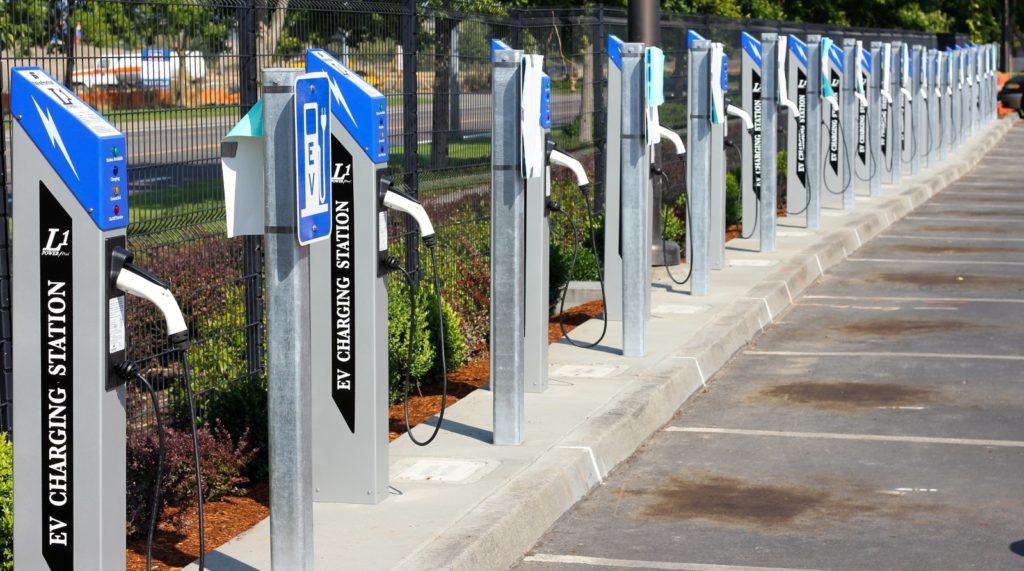
EV chargers are becoming part of the landscape in may large malls.
Behind that Staff Direction was an informative presentation on what the city has in the way of electric vehicle (EV) charging stations and where they are located and the astounding fact that the city cannot charge a user for the electricity they let flow into their vehicles.
Apparently only Burlington Hydro can sell you electricity.
The need to electrify transportation has been identified as a vital action in both the City’s Climate Action Plan and Corporate Energy and Emissions Management Plan.
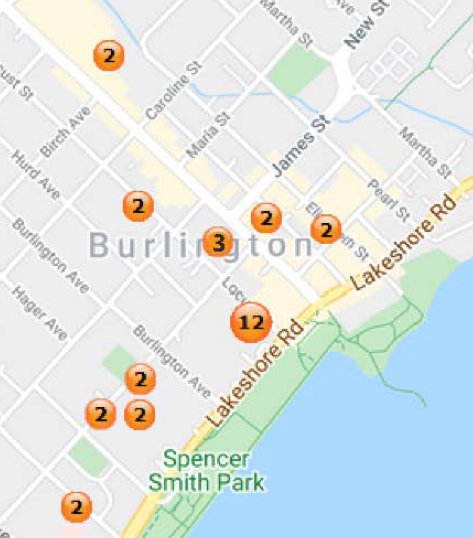
EV charging stations downtown
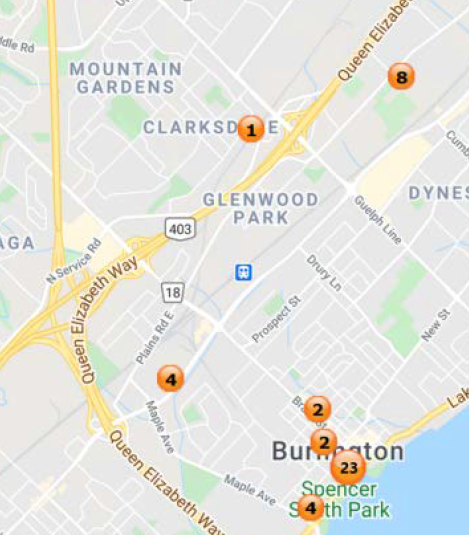
EV charging stations throughout the city.
The City installed its first public access electric vehicle (EV) charging station in 2015 in the downtown parking garage and has expanded its portfolio each year with the largest installation being in 2018 with the addition of 12 dual head stations partially funded under the province’s Workplace Electric Vehicle Charging Incentive Program.
The City of Burlington currently has 23 Electric Vehicle (EV) charging stations on city property with a total of 44 charging heads. The majority of these units can be found in downtown parking lots.
There are three types of charging stations available for use, Level 1, Level 2 and Level 3.
Level 1 stations would be a charger that would come with an electric vehicle when purchased and plug into a standard 120 volt, 15 amp wall outlet. Charging times at these stations vary with vehicle and charger but will typically charge 200km in approximately 20 hours.
Level 2 stations are stations like the city currently has installed in its parking lots. These are stations with 1 or 2 charging heads using 240 volts and either 40 or 50 amps. Typical charge time at these stations is 200km in approximately 5 hours.
Level 3 stations or “Fast Chargers” operate at direct current (DC) voltage, sometimes as high as 800 volts, and can charge a vehicle 160km in approximately 30 minutes.
Currently all City of Burlington chargers are Level 2 chargers.
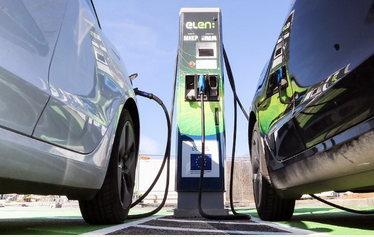
Example of a level 2 charging station
In 2020 additional stations were installed for city operated fleet vehicles at Fire Station Headquarters, Roads, Parks and Forestry Operations Centre and the Burlington Animal Shelter.
In 2020, funds from the Parking District reserve were allocated to install 3 additional EV charging stations in City owned parking lots namely in lots 1, 8 and one level 3 EV charger in a lot in close proximity to Brant Street. Due to the reassignment of Parking Services staff and other additional unexpected work assignments, the EV chargers were not installed in 2020. This work is expected to be carried out in 2021.
During budget discussions at the January 12, 2021 CSSRA Committee, staff were directed to provide further information on the Parking District reserve fund specifically related to how the fund is broken down and funded.
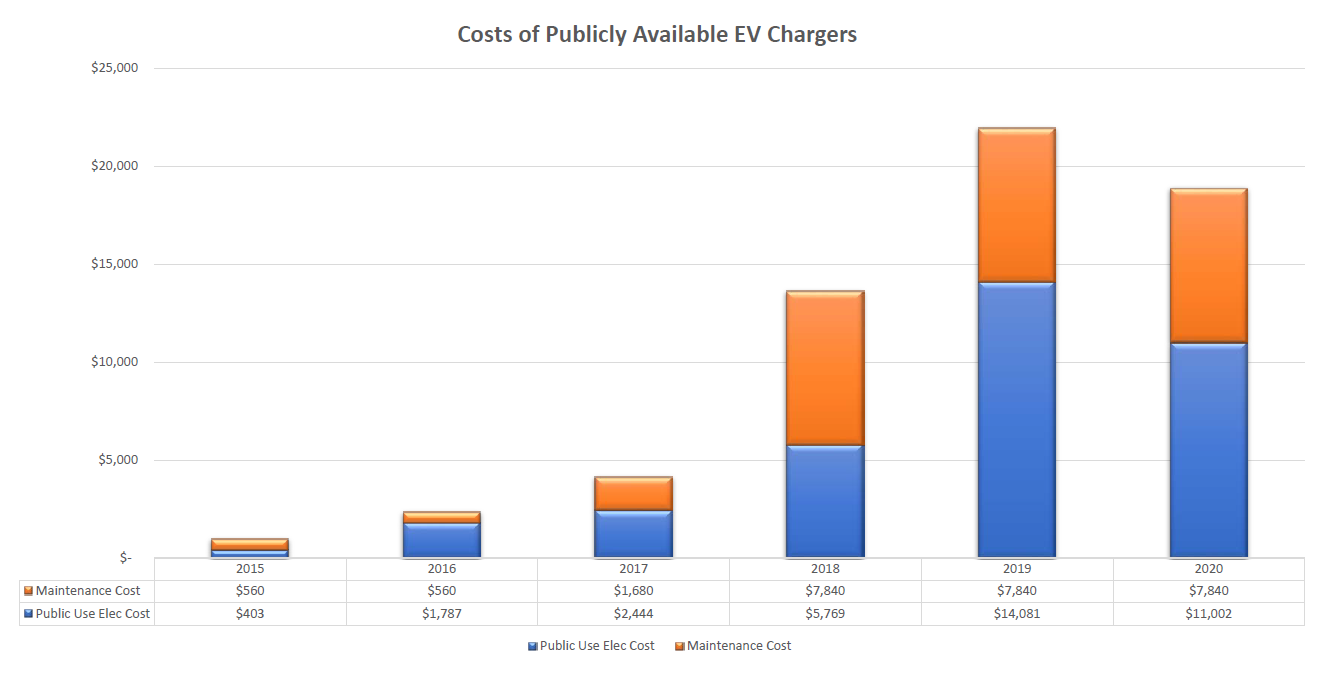
The city absorbs the cosy of the electricity that comes from Burlington Hydro The city cannot sell the electricity.
The Parking District reserve fund was set up for funding capital improvements to city owned parking facilities within the downtown as well as funding in years with operating shortfalls. Since the one reserve fund model did not sufficiently differentiate the use of funds, in June 2020 council approved the creation of three separate and distinct reserve funds to ensure the most efficient use of the balance by clearly distinguishing funds for stabilization of operations, lifecycle costing for all parking assets (renewal) and future growth in parking supply.
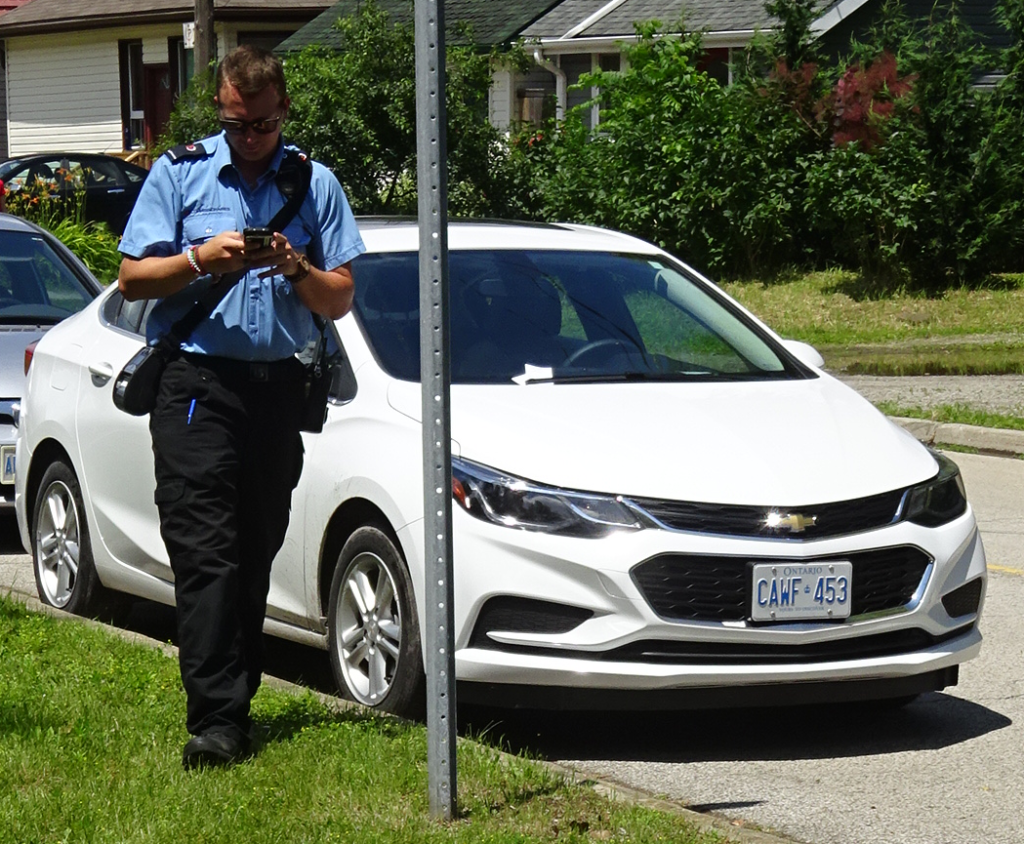
Parking fines go into the Parking Reserve fund – which at this point is covering the cost of the EV chargers.
As of September 30, 2020 the existing Parking District reserve fund has a balance of $9,566,345.
Based on a financial model the balance is being allocated amongst the three newly created reserve funds as follows:
Parking Renewal – $2.5 million reflects the city’s parking asset inventory and required needs
Stabilization of Operations – $0.2 million this balance reflects a target of 10-15% (3 year rolling average) of operating revenues for the purposes of stabilization of operations
Parking Growth – $6.9 million to reflect the anticipated growth in parking demand
The revenues (and associated percentages) that support the total expenses and provision to the reserve fund are as follows:
property tax levy against the business properties of $304,200 plus a payment in lieu for exempt/partially exempt city properties of $39,327 for a total of $343,527 (13.0%)
parking fines of $470,000 (17.7%)
parking fee revenues of $1,838,546 (69.3%)
Staff believe that it is appropriate to use the Parking District funds to cover the costs of EV chargers for city owned parking facilities in downtown Burlington.
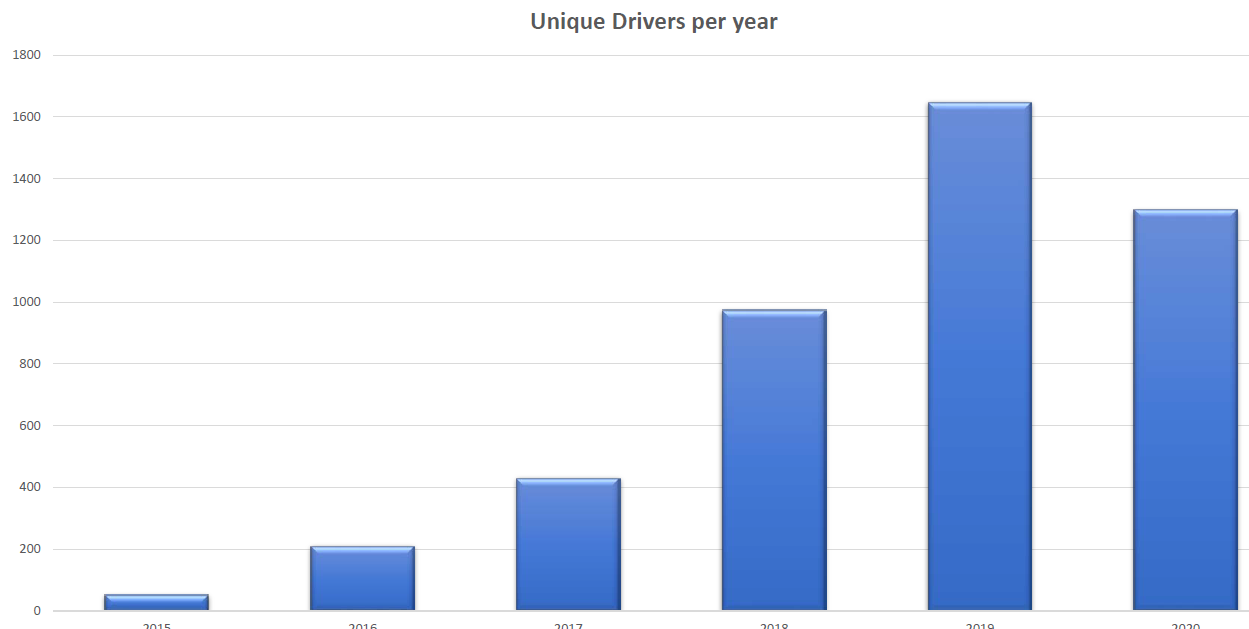
This bar chart shows the number of unique users .
City staff are also currently working on the installation of 11 additional dual head charging stations for spring 2021 that will be accessible to the public. These stations are being installed as part of the council directed budget addition in the 2020 capital budget. Charging stations will be installed at the following city facilities;
– Tansley Woods Community Centre (4 heads)
– Appleby Ice Centre (4 heads)
– Central Park Campus (4 heads)
– Mountainside Recreation Centre (2 heads)
– Haber Recreation Centre / Norton Park (2 heads)
– Nelson Recreation Centre (2 heads)
– Aldershot Arena (2 heads)
– Mountainside Recreation Centre (2 heads)
With the installation of these charging stations the City will have 33 charging stations installed with 26 of those being publicly accessible.
It is expected that additional stations will be installed in the coming years as part of the green fleet strategy for corporate vehicles.
Detailed information on charging usage and times is available for 20 of the city’s 23 chargers. Staff are currently working to secure a more accurate means of monitoring the other three charging stations.
Through the years the utilization of the publicly available charging stations increased annually with the installation of additional charging stations and increased awareness of the stations. However, an obvious dip can be seen in the graph below in March 2020 coinciding with the start of the COVID-19 Pandemic.
Other sustainable mobility options will be considered and assessed through the development of the Integrated Mobility Plan.
Currently there are no fees for using a city EV charger, however, electricity used for these stations carries an annual cost as does ongoing maintenance and programming/data access for the charging stations.
Annual costs of operating the EV charging stations vary.
These costs are expected to increase annually by an additional $20,000 to $39,000 (electricity cost plus operations/maintenance), depending on charging activity, with the installation of the additional 13 charging stations as part of the 2020 capital budget.
These projected costs do not include the operational costs of the level three charging station that is to be installed in 2021 due to unknown charger specifications and utilization rates.
The City does not charge staff or the public for using the chargers. However, due to the rising utilization of the City’s charging stations and the general growth of the City’s charging assets the addition of an hourly fee to our charging stations is necessary. The City is unable to charge directly for electricity consumption but can base the charge on an hourly rate to use the charging station.
That idea didn’t sit well with most of the Council members. Mayor Meed Ward saw the charging stations as a draw the malls and large box retailers would use to attract traffic.
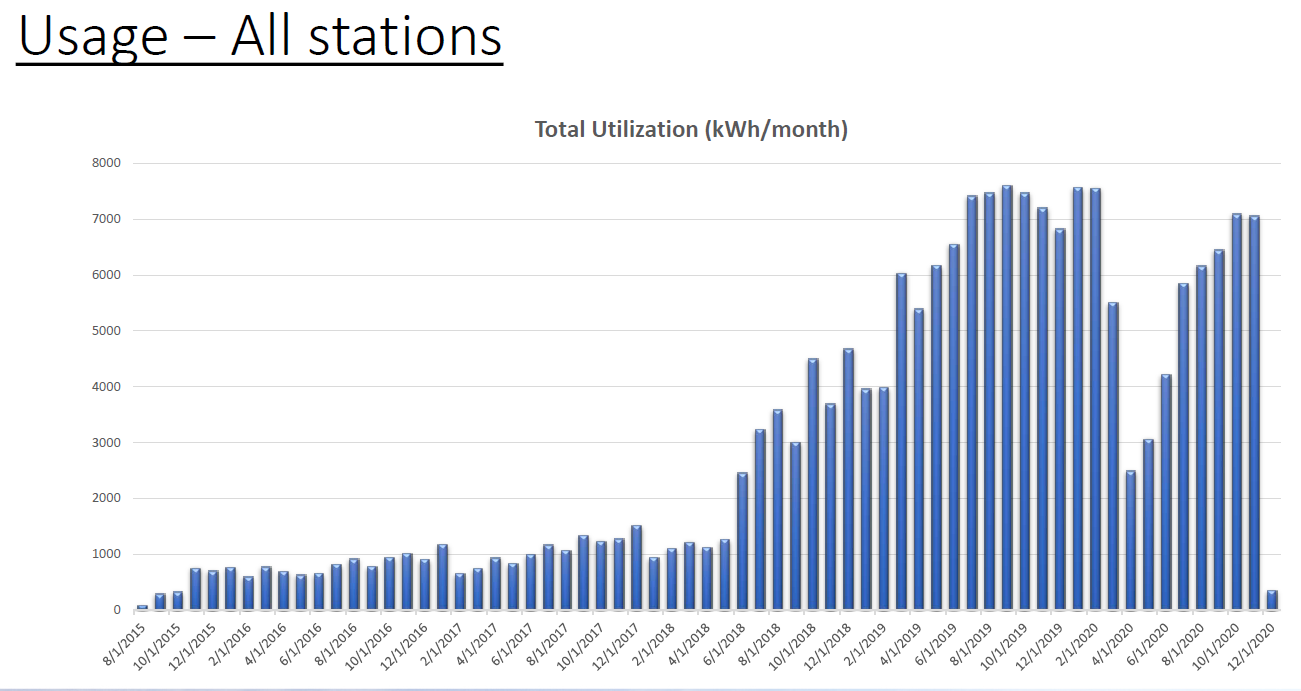
The usage of the EV charging station has grown – the dip during the first lock-down is evident.
A new policy regarding fees for EV Charging is recommended to be developed in 2021. This would include items such as fees for public users and staff users, charging time limits, introduction of a penalty fee if an overstay is detected, as well as how to direct the funds that are collected.
Currently the cost of electricity consumption at the charging stations are covered under operating budgets for electricity accounts for the various assets that house our charging infrastructure. Installation and ongoing maintenance fees have been covered through facility or parking asset operating budgets.
Since 2015 the city has helped residents and our own corporate fleet reduce emissions by approximately 82.5 tons, which is equivalent to the carbon sequestered by approximately 1356 seedlings grown for 10 years.



















Hey City Council!!!!!! Do not use my tax dollars to pay for electricity for someone else’s car . Your climate emergency is a tax scam and voters never voted for you all to run all green .
It is not good enough to simply say the City cannot charge for hydro. Otherwise they are giving away the energy to select people. I want to get free gasoline for my car too, but I have to pay, including the taxes. I don’t want to indirectly pay for somebody else as well.
Those of us who have cars that we fill up with gas, pay for it. Much of the cost goes to pay for taxes that goes to the government.
I think that people who have electric cars, should not only pay for the energy they use, but also taxes to the government.
I find it interesting that this Council doesn’t want to charge to use the City Charging Stations , I think as an incentive for people to purchase electric cars, but are still purchasing non-electric buses.
Well with the move away from carbon based energy and toward unreliable wind and solar, along with cars being forced to go ev, people will long for 300 dollars a barrel oil prices.
Really enjoyed the article, however I would suggest that you black out the licence plate of the white vehicle you have pictured to protect the identity.